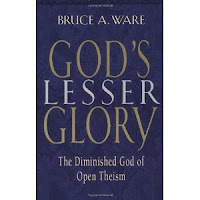Book Review: God’s Lesser Glory: The Diminished God of Open Theism
Author: Bruce A. Ware
Reviewed by: Timothy Jin
Prior to reading God’s Lesser Glory, I had never done any reading on the topic of open theism, which is a doctrine that Dr. Bruce Ware challenges in this book. It was with some surprise that I found out that open theists believe that God does not know the future and that He can change His mind, beliefs that run counter to those which I took for granted from as long as I can recall. By allowing uncertainty in the future, open theists claim that God allows man to be an active participant in the grand fulfillment of God’s sovereign plan. These beliefs are so contrary to traditional ideas about God and His omniscience that I wondered how one could claim to be a student of the Bible and espouse these doctrines at the same time. Thankfully, Bruce Ware does an excellent job of summarizing the beliefs of open theists and deconstructing their arguments, thus preserving the glory of God in His ultimate sovereignty and knowledge.
In the first part of the book, Ware presents the viewpoint of open theists. He develops the ideas of open theism fairly, clearly and concisely, citing various authors while avoiding any harsh language. Openness proponents believe that God willingly gave up His complete foreknowledge and sovereignty in order to give free choice to humans. By giving man free choice God opens up the door to all kinds of risks, where anything can happen, but in that risk there is greater reward in the relationship between God and man. Without that risk, man would have his days laid out and predetermined by God, which leaves him without the freedom to act and react to his life and makes him merely a puppet controlled by the Divine Ventriloquist. In such a doctrinal stance, there are many derived implications. God is no longer able to see into the future and orchestrate everything that ever will occur. He is now reading and reacting to every situation and the free actions determined by the free wills of men. He also is prone and liable to make mistakes, sometimes needing to reassess what He has done in the past and make correction for them. Ware cites an example that open theists use of God “learning from the flood” of its disastrous effect and promising never again to bring such destruction upon man. Open theists even argue that the openness perspective allows God to be more “on our side” because then God cannot be blamed when we suffer. He has relinquished His control of the future; therefore, when bad things happen, He is truly our friend, caring for us in our sufferings and not to be blamed. While some aspects of this theology may tickle the ears, Ware then shows why these arguments are unsound.
Bruce Ware’s arguments for a traditional view of God’s exhaustive foreknowledge and sovereignty are carefully and skillfully constructed. He walks through many of the texts that open theists have cited as evidences of the openness of God, and he debunks their understanding of each of those texts. With a proper hermeneutic and careful exegesis, Ware shows that texts dealing with God’s repentance, change of mind, forgetfulness, etc. can be explained as God’s dealing with men in a particular moment, and that does not negate His absolute foreknowledge. For example, when Abraham raised the knife showing his faith in God, then God saw that Abraham believed Him. Yet the passage is not saying that only at that point did God figure out that Abraham was faithful, but the intent is that only in that moment did Abraham really complete a demonstration of a faithful will. Then God responded, seeing his faith. That does not negate God’s foreknowledge since it can be inferred from Abraham’s previous dealings with God that God must have known him to be a faithful man already. After addressing the faulty interpretation of certain passages in openness theology, Ware cites passage after passage affirming the exhaustive foreknowledge of God and His absolute control. The Scriptures are filled with texts affirming the traditional understanding of God’s omniscience, and Ware makes it clear that open theists seem to ignore these texts while focusing on just a few texts to try and make a case.
After reading God’s Lesser Glory, I realized that holding firmly to the doctrines of God’s exhaustive foreknowledge and ultimate sovereignty in all things is absolutely critical. In the final section of the book, Ware focuses on the implications of open theism to daily life. He argues that if open theism is true then we cannot pray with confidence, trust God to guide our decisions, or find any comfort in Him when we suffer. For if God does not know the future and He can only read and react to the present, then all of the future is determined by a smattering of free human wills. In essence, He is as helpless as we are and can provide no guarantees of security and hope. The God of open theism is a God that has been stripped of His power and His glory. When confronted with these realities, it is clear that only a God who knows the future and can act upon it is an awe-inspiring Sovereign who is worthy of worship. We can be thankful then that in this book, Bruce Ware makes such a masterful defense of the glory of Almighty God.

